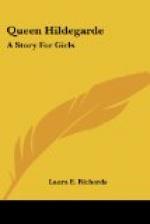But her courage failed when she found that to do this she must mingle with the crowd of strange haymakers; and besides, among them she saw the clumsy form and shock head of Caliban, as she had secretly named the clownish and surly nephew of her good host. This fellow was the one bitter drop in Hilda’s cup. Everything else she had learned to like, in the month which had passed since she came to Hartley’s Glen. The farmer and his wife she loved as they deserved to be loved. The little maidservant was her adoring slave, and secretly sewed her boot-buttons on, and mended her stockings, as some small return for the lessons in crochet and fancy knitting that she had received from the skilful white fingers which were a perpetual marvel to her. But Simon Hartley remained what she had at first thought him,—a sullen, boorish churl. He was a malevolent churl too, Hildegarde thought; indeed she was sure of it. She had several times seen his eyes fixed on his uncle with a look of positive hatred; and though Farmer Hartley was persistently kind and patient with him, trying often to draw him into conversation, and make him join in the pleasant evening talks which they all enjoyed, his efforts were unsuccessful. The fellow came in, gobbled his food, and then went off, if his work was over, to hide himself in his own room. Hilda was quite sure that Nurse Lucy liked this oaf no better than she herself did, though the good woman never spoke impatiently or unkindly to him,—and indeed it would be difficult for any one to like him, she thought, except possibly his own mother.
Our Queen took presently her seat on a right royal throne of fragrant hay, and gave herself up to the full delight of the summer morning, and of the “Field of the Cloth of Gold,” as she had instantly named the shining yellow plain, which more prosaic souls knew as “the ten-acre lot.” The hay rustled pleasantly as she nestled down in it, and made a little penthouse over her head, to keep off the keen, hot sun-arrows. There was a great oak-tree too, which partly shaded this favored haycock, and on one of its branches a squirrel came running out, and then sat up and looked at Hildegarde with bright, inquisitive eyes. A maiden, all brown and gold, on a golden haycock! What strange apparition was this? Had she come for acorns? Did she know about the four young ones in the snug little house in the hollow just above the first branch! Perhaps—dreadful thought!—she had heard of the marvellous beauty of the four young ones, and had come to steal them. “Chip!” whisk! and Madam Squirrel was off up the branch like a streak of brown lightning, with its tail up.




